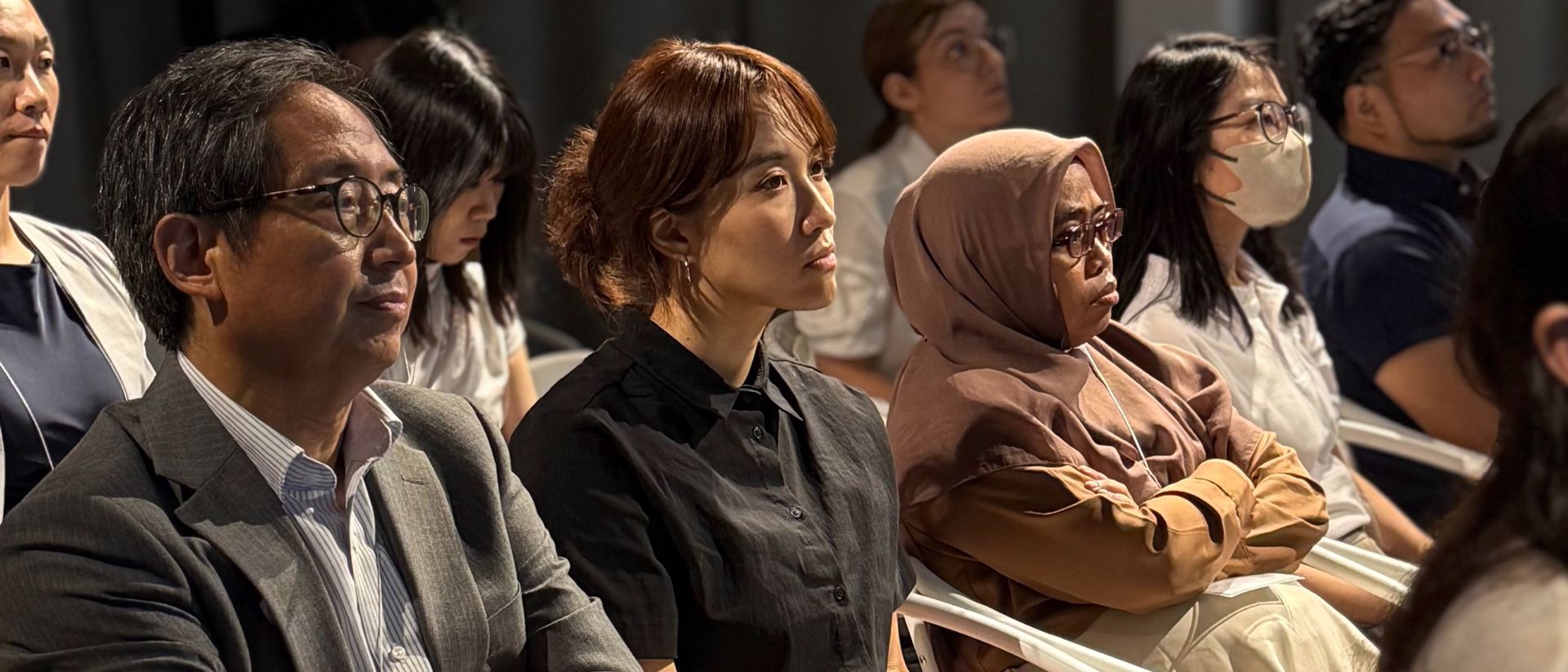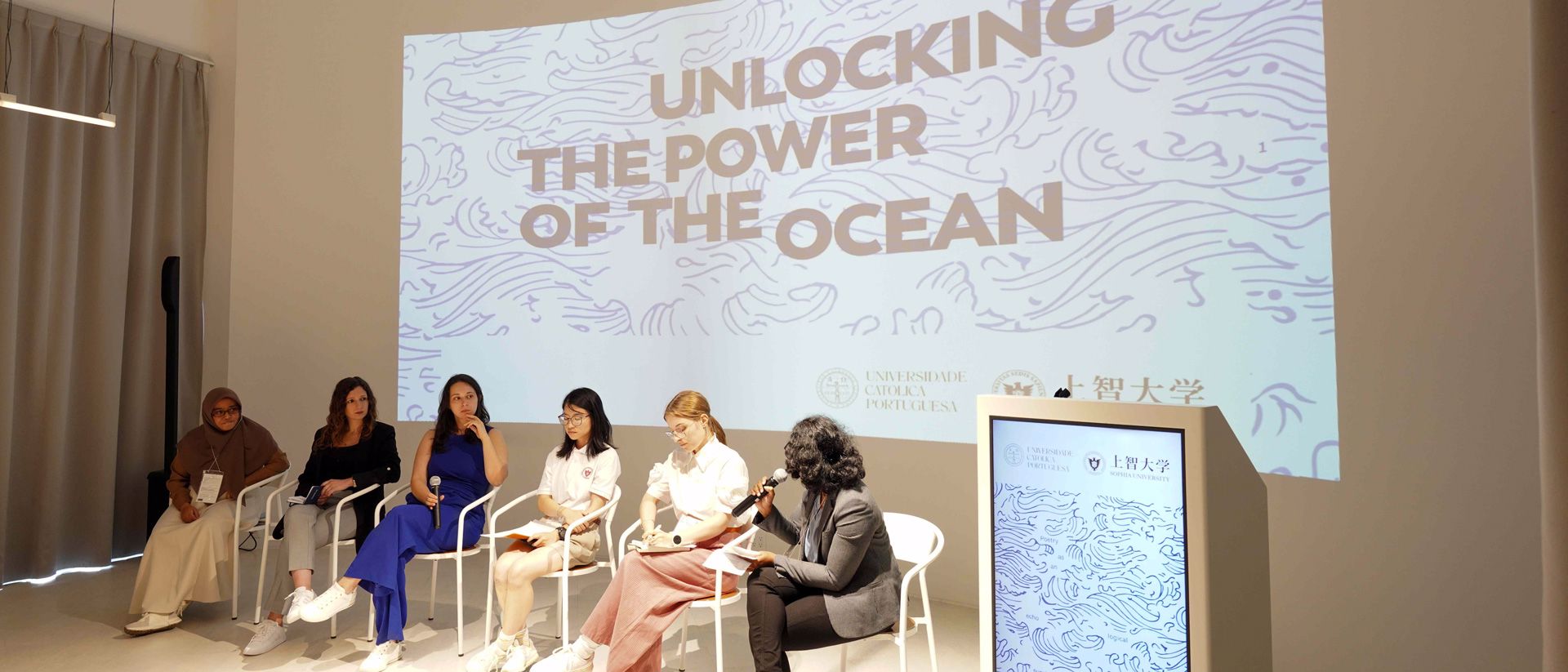On 18 June, the Portuguese Catholic University (UCP) organised the seminar “The Sea as Potential and Representation: Unlocking the Power of the Oceans” at the Portugal Pavilion of Expo 2025 Osaka, in partnership with Sophia University, Tokyo.
The initiative brought together academics and experts from different nationalities and fields of knowledge for a multidisciplinary discussion on the meanings and challenges associated with the ocean — as an economic resource, a natural element, a symbolic space, and a place of innovation. The event attracted an international and engaged audience, with several questions and contributions directed at the speakers.
In her opening address, Isabel Capeloa Gil, Rector of the Portuguese Catholic University, highlighted the relevance of the sea as a space for encounter, knowledge, and shared responsibility: "The presence of the Portuguese Catholic University at Expo 2025 Osaka reflects our commitment to building a more sustainable and more humane future. By bringing together science, art, and environmental awareness, we reaffirm the role of knowledge as a driving force for global transformation.”
The initiative brought together academics and experts from different nationalities and fields of knowledge for a multidisciplinary discussion on the meanings and challenges associated with the ocean — as an economic resource, a natural element, a symbolic space, and a place of innovation. The event attracted an international and engaged audience, with several questions and contributions directed at the speakers.
In her opening address, Isabel Capeloa Gil, Rector of the Portuguese Catholic University, highlighted the relevance of the sea as a space for encounter, knowledge, and shared responsibility: "The presence of the Portuguese Catholic University at Expo 2025 Osaka reflects our commitment to building a more sustainable and more humane future. By bringing together science, art, and environmental awareness, we reaffirm the role of knowledge as a driving force for global transformation.”

The seminar programme featured three thematic panels:
• Coastal Zone Management, with contributions from Vindya Hewawasam (Sri Lanka), Guangwei Huang (Japan), and Nkweauseh Reginald Longfor (Africa)
• Marine Biotechnology, with Ana Gomes and Paula Castro
• Marine Ecology, Law and Governance, with Maria Ermida and Sónia Ribeiro.
A round table on ocean sustainability followed, moderated by Vindya Hewawasam, featuring young researchers of various nationalities, including Margaux Annemarie Duhem, Jiarong Hu, Dyna Apriyanti, Sara Cunha, and Maria Ermida.
The afternoon continued with a talk on the blue economy by Nelson Lage, President of ADENE — Portuguese Energy Agency, and a presentation by Daniel Ribas on the ocean in contemporary Portuguese cinema.
• Coastal Zone Management, with contributions from Vindya Hewawasam (Sri Lanka), Guangwei Huang (Japan), and Nkweauseh Reginald Longfor (Africa)
• Marine Biotechnology, with Ana Gomes and Paula Castro
• Marine Ecology, Law and Governance, with Maria Ermida and Sónia Ribeiro.
A round table on ocean sustainability followed, moderated by Vindya Hewawasam, featuring young researchers of various nationalities, including Margaux Annemarie Duhem, Jiarong Hu, Dyna Apriyanti, Sara Cunha, and Maria Ermida.
The afternoon continued with a talk on the blue economy by Nelson Lage, President of ADENE — Portuguese Energy Agency, and a presentation by Daniel Ribas on the ocean in contemporary Portuguese cinema.

Alongside the seminar, the artistic installation “Poetry as an Echological Survival”, by Nuno da Luz, was inaugurated. Curated by Nuno Crespo and produced by the School of Arts of the Portuguese Catholic University, the installation translates natural phenomena into sensory experiences through ambient sound, lighting modulated by real tide and wave data, and audiovisual recordings from the Fukushima coast in Japan.
"This installation is a form of listening and translation — an invitation to feel, through the body and space, the strength of the ocean and how it shapes our world. Working with waves, sounds, and tides allows us to transform the invisible into sensory experience and reconnect with a planet in constant flux," explains Nuno da Luz, artist and researcher.
The event concluded with an institutional reception, celebrating the contribution of Portuguese academia to the global dialogue on the ocean — a dialogue aligned with Portugal's theme at Expo 2025 Osaka: “Ocean: the Blue Dialogue”.
"This installation is a form of listening and translation — an invitation to feel, through the body and space, the strength of the ocean and how it shapes our world. Working with waves, sounds, and tides allows us to transform the invisible into sensory experience and reconnect with a planet in constant flux," explains Nuno da Luz, artist and researcher.
The event concluded with an institutional reception, celebrating the contribution of Portuguese academia to the global dialogue on the ocean — a dialogue aligned with Portugal's theme at Expo 2025 Osaka: “Ocean: the Blue Dialogue”.



